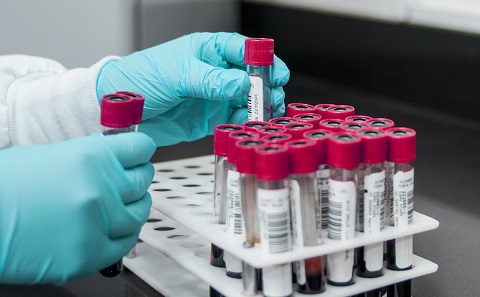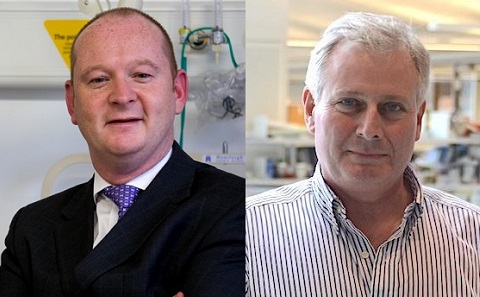Trial identifies types of aggressive lymphoma where survival is improved by a targeted cancer drug

Adding a targeted cancer drug to standard chemotherapy treatment can improve survival for some patients with aggressive lymphoma.
The long-term results of the REMoDL-B trial were presented at the American Society of Hematology (ASH) annual conference in America on Monday (12th December).
The trial was led by Professors Peter Johnson and Andy Davies, at the University of Southampton and was run by the Cancer Research UK Southampton Clinical Trials Unit in collaboration with the Swiss SAKK lymphoma group.
The results show that specific molecular markers could identify patients with diffuse large B cell lymphoma (DLBCL) who are more likely to remain in remission after treatment and to survive, with the addition of the targeted cancer drug bortezomib.
These results could lead to a new treatment option for patients in the future.

Improving current treatments
Currently patients with DLBCL are treated with a combination of chemotherapy and immunotherapy, called R-CHOP.
“Although this treatment works for many people, there are some patients whose lymphoma does not respond to R-CHOP or comes back after initial treatment,” says Professor Davies, Professor of Haematological Oncology at the University of Southampton, who presented the results at the conference earlier.
“Bortezomib is a drug which interferes with the growth of cancer cells. It’s already used in myeloma and mantle cell lymphoma, and we wanted to test if it could also be used to treat people with DLBCL by adding it to their standard treatment.”
Over a thousand patients across the UK and Switzerland were recruited into the REMoDL-B trial. Half were treated with standard care R-CHOP therapy, while the other half were given the standard treatment plus bortezomib. Biopsy samples from participants were also sent to the laboratory for molecular profiling, to analyse the genetic make-up of their cancer.
The five-year follow-up results show that although the addition of bortezomib did not improve outcomes for all DLBCL patients, there were some subgroups of patients with particular genetic markers that did see positive effects.
“For patients with subtypes called Molecular High-Grade (MHG) lymphoma and Activated B Cell (ABC) lymphoma, we saw a reduced risk of the cancer progressing or coming back with the addition of bortezomib,” says Louise Stanton, Principal Statistician at the Southampton Clinical Trials Unit. “Excitingly, we also saw an improvement in the number of patients surviving, and their duration of survival in the ABC subgroup compared to those not given bortezomib.”
Hopes for the future
“These are extremely promising results,” says Professor Davies. “However, bortezomib is not currently licensed or funded for use in patients with DLBCL. The type of molecular profiling that we carried out in the trial to establish these patient subgroups is not routinely carried out on the NHS. But we hope the results from the REMoDL-B trial could lead to the use of more molecular testing in future and new treatment options for these patient groups.”
Richard Stephens was diagnosed with lymphoma in 1998 and was himself a participant on an earlier clinical trial. He worked with the trial team as a patient representative throughout the REMoDL-B trial.
"This study is another step forwards in precision medicine for patients like me, finding the right diagnosis and the right treatment for each of one of us”, says Richard. “I am proud to have been involved in a research project that has produced useful results to improve clinical practice and decision-making."
The REMoDL-B trial was run in collaboration with the National Cancer Research Institute (NCRI) and the Swiss Group for Clinical Cancer Research (SAKK). It was funded by an unrestricted educational grant from Janssen-Cilag and is endorsed by Cancer Research UK.
Advancing our lymphoma research
The long-term results of another lymphoma trial called ACCEPT were also presented at the ASH conference by Professor Davies and the Southampton Clinical Trials Unit team.
Like REMoDL-B, this trial looked at the addition of an extra drug to standard R-CHOP treatment for people with DLBCL. In this trial, it was a drug called acalabrutinib which works by blocking the chemical messages that tell cancer cells to grow.
ACCEPT was a small, early-phase trial that looked primarily at the safety of the drug and aimed to establish the optimum dose of acalabrutinib to give to DLBCL patients.
The results of this trial have led to a larger, phase II trial of acalabrutinib called REMoDL-A which is currently recruiting at hospitals across the UK.
Notes for editors
The REMoDL-B trial - A Randomised Evaluation of Molecular guided therapy for Diffuse Large B-cell Lymphoma with Bortezomib. Visit the REMoDL-B website.
The Southampton Clinical Trials Unit (SCTU) is a National institute for Health and Care Research (NIHR) supported and Cancer Research UK (CRUK) core funded CTU with expertise in the design, conduct and analysis of interventional, multi-centre clinical trials. The CTU is based within the University of Southampton with offices at the University Hospital Southampton NHS Foundation Trust Southampton General Hospital site. For more information, visit the SCTU website.
The University of Southampton (UoS) drives original thinking, turns knowledge into action and impact, and creates solutions to the world’s challenges. We are among the top 100 institutions globally (QS World University Rankings 2023). Our academics are leaders in their fields, forging links with high-profile international businesses and organisations, and inspiring a 22,000-strong community of exceptional students, from over 135 countries worldwide. Through our high-quality education, the University helps students on a journey of discovery to realise their potential and join our global network of over 200,000 alumni. www.southampton.ac.uk
The ACCEPT trial – A Phase Ib/II combination of acalabrutinib with rituximab, cyclophosphamide, doxorubicin, vincristine and prednisolone (R-CHOP) for patient Diffuse Large B-cell Lymphoma (DLBCL). Visit the ACCEPT website.
The REMoDL-A trial - A randomised Phase II Evaluation of Molecular Guided Therapy for Diffuse Large B-Cell Lymphoma with Acalabrutinib (REMoDL-A). Visit the REMoDL-A website.